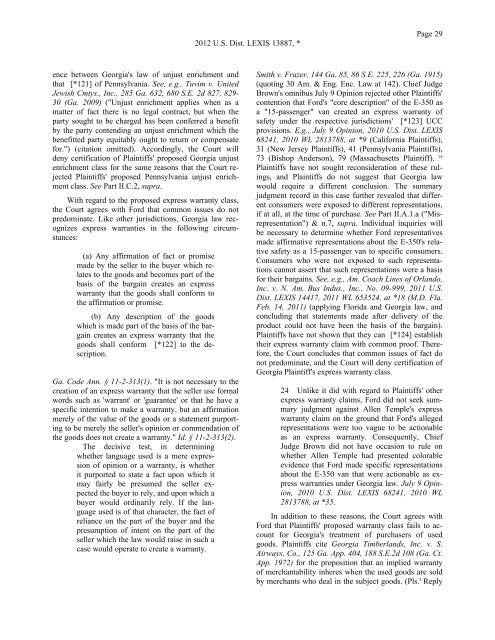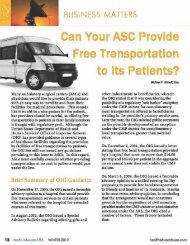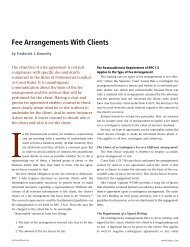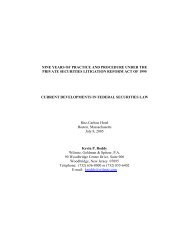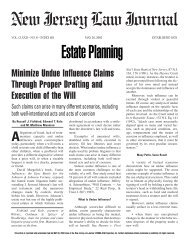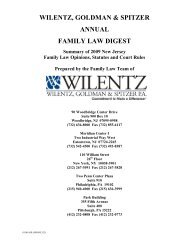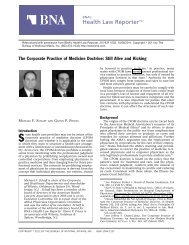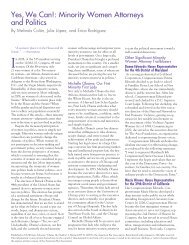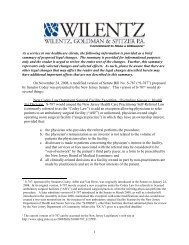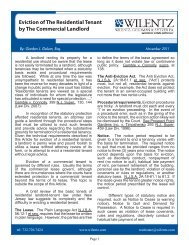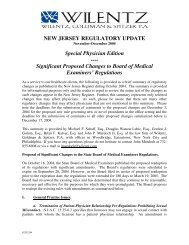2012 U.S. Dist. LEXIS 13887, *Page 28featu<strong>re</strong>s of California's law of unjust enrichment thatwould compel a diffe<strong>re</strong>nt conclusion. See, e.g., Ghirardov. Antonioli, 14 Cal. 4th 39, 57 Cal. Rptr. 2d 687, 924P.2d 996, 1003 (Cal. 1996) ("Under the law of <strong>re</strong>stitution,an individual may be <strong>re</strong>qui<strong>re</strong>d to make <strong>re</strong>stitution ifhe is unjustly enriched at the expense of another. A personis enriched if he <strong>re</strong>ceives a benefit at another's expense.The term 'benefit' 'denotes any form of advantage.'Thus, a benefit is confer<strong>re</strong>d not only when one adds tothe property of [*117] another, but also when one savesthe other from expense or loss.") (citing Restatement ofRestitution § 1); February 16 Opinion, 2011 U.S. Dist.LEXIS 16504, 2011 WL 601279, at *5 (<strong>re</strong>cognizing similaritiesbetween law of unjust enrichment in Pennsylvaniaand California). Accordingly, the <strong>Co</strong>urt will denycertification of Plaintiffs' proposed California unjust enrichmentclass for the same <strong>re</strong>asons that the <strong>Co</strong>urt <strong>re</strong>jectedPlaintiffs' proposed Pennsylvania unjust enrichmentclass. See Part <strong>II</strong>.C.2, supra. 2222 Two Ninth Circuit decisions cited by Plaintiffs,Chamberlan v. <strong>Ford</strong> <strong>Motor</strong> <strong>Co</strong>., 402 F.3d952 (9th Cir. 2005) and Hanlon v. Chrysler<strong>Co</strong>rp., 150 F.3d 1011 (9th Cir. 1998), do notsupport certification of Plaintiffs' California unjustenrichment class. Chamberlan denied interlocutory<strong>re</strong>view of the district court's certificationof a class under the California <strong>Co</strong>nsumers LegalRemedies Act. 402 F.3d at 962. The common issuesin that case we<strong>re</strong>: "(1) whether the design ofthe plastic intake manifold was defective; (2)whether <strong>Ford</strong> was awa<strong>re</strong> of alleged design defects;(3) whether <strong>Ford</strong> had a duty to disclose itsknowledge; (4) whether it failed to do so; (5)whether the facts that <strong>Ford</strong> allegedly failed todisclose we<strong>re</strong> [*118] material; and (6) whetherthe alleged failu<strong>re</strong> to disclose violated theCLRA." Id. Chamberlan did not involve an unjustenrichment class under California law, andits analysis of common issues under California'sconsumer fraud statute is not applicable to the<strong>re</strong>maining consumer fraud claims (Florida, NewYork, Texas) in this MDL action. Likewise, Hanlon,which approved a class settlement of productdefect claims against a minivan manufactu<strong>re</strong>r, didnot add<strong>re</strong>ss certification of an unjust enrichmentclaim under California law, and the court's scantp<strong>re</strong>dominance analysis did not add<strong>re</strong>ss any materialfactual variations among consumers thatwould <strong>re</strong>qui<strong>re</strong> individualized t<strong>re</strong>atment of classmembers' claims. Thus, Hanlon provides minimalsupport for Plaintiffs' position in this case, whe<strong>re</strong>the summary judgment <strong>re</strong>cord <strong>re</strong>vealed numerous,material diffe<strong>re</strong>nces from Plaintiffs' <strong>re</strong>spectiveconsumer experiences.G. GeorgiaGeorgia Plaintiff Allen Temple seeks certification ofits <strong>re</strong>maining exp<strong>re</strong>ss warranty, implied warranty, andunjust enrichment claims. See July 9 Opinion, 2010 U.S.Dist. LEXIS 68241, 2010 WL 2813788, at *38. AllenTemple is the only Plaintiff that still has an active exp<strong>re</strong>sswarranty claim after the summary judgment[*119] rulings. The parties p<strong>re</strong>sent essentially the samearguments in support of the implied warranty and unjustenrichment claims. <strong>In</strong> addition, the parties disputewhether purchasers of used vans can be included in awarranty class under Georgia law. 23 With <strong>re</strong>gard to theexp<strong>re</strong>ss warranty class, <strong>Ford</strong> argues that Chief JudgeBrown's summary judgment rulings as to other namedPlaintiffs <strong>re</strong>veal that diffe<strong>re</strong>nt consumers we<strong>re</strong> exposedto diffe<strong>re</strong>nt <strong>re</strong>p<strong>re</strong>sentations about the E-<strong>350</strong>'s seatingcapacity and <strong>re</strong>lative safety. <strong>Co</strong>nsequently, <strong>Ford</strong> <strong>re</strong>asonsthat the p<strong>re</strong>siding court would have to undertake individualizedinquiries of putative class members' <strong>re</strong>spectiveconsumer experiences to see if any affirmative <strong>re</strong>p<strong>re</strong>sentationsby <strong>Ford</strong> became the "basis of the bargain."(<strong>Ford</strong> Resp. Br. at 65). Plaintiffs do not appear to add<strong>re</strong>ss<strong>Ford</strong>'s exp<strong>re</strong>ss warranty argument in their <strong>re</strong>ply brief, butin their class certification brief Plaintiffs generally arguedthat "[w]hether <strong>Ford</strong>'s marketing of the E-<strong>350</strong> as a15-passenger vehicle, its '15 Passenger' name, and 15installed [sic] seats, constitutes a description and warrantyof safe 15-passenger travel turns wholly on how<strong>Ford</strong> sold the vans, not on any particulars in [*120] <strong>re</strong>spectof consumers." (Pls.' Br. at 43). The <strong>Co</strong>urt ag<strong>re</strong>eswith <strong>Ford</strong> on all counts.23 Plaintiffs' <strong>re</strong>ply brief modified the proposedunjust enrichment classes to extend only to purchasersof new E-<strong>350</strong> vans, but Plaintiffs havenot sought to modify their implied warrantyclasses in the same vein.This <strong>Co</strong>urt detects no material diffe<strong>re</strong>nces betweenGeorgia's implied warranty law and Pennsylvania's impliedwarranty law that would compel a diffe<strong>re</strong>nt conclusion.Like Pennsylvania, Georgia's implied warranty law<strong>re</strong>qui<strong>re</strong>s a showing of causation that can be overcome byproof that the consumer had actual knowledge of thedefect at the time of purchase. See, e.g., Ga. <strong>Co</strong>de Ann.§§ 11-2-314 Cmt. 13, 11-2-316(3)(b) & Cmt. 8; W.M.Hobbs, Ltd. v. Accusystems of Ga., <strong>In</strong>c., 177 Ga. App.432, 339 S.E.2d 646, 647 (Ga. Ct. App. 1986) (<strong>re</strong>jectingimplied warranty claim whe<strong>re</strong> consumer had the opportunityto use the copier machine on a trial basis prior topurchase). Accordingly, the <strong>Co</strong>urt's causation analysis ofthe New York and Pennsylvania implied warrantyclasses applies equally he<strong>re</strong>. See Parts <strong>II</strong>.A.2 and <strong>II</strong>.C.1,supra. Likewise, the <strong>Co</strong>urt discerns no material differ-
2012 U.S. Dist. LEXIS 13887, *Page 29ence between Georgia's law of unjust enrichment andthat [*121] of Pennsylvania. See, e.g., Tuvim v. UnitedJewish Cmtys., <strong>In</strong>c., 285 Ga. 632, 680 S.E. 2d 827, 829-30 (Ga. 2009) ("Unjust enrichment applies when as amatter of fact the<strong>re</strong> is no legal contract, but when theparty sought to be charged has been confer<strong>re</strong>d a benefitby the party contending an unjust enrichment which thebenefitted party equitably ought to <strong>re</strong>turn or compensatefor.") (citation omitted). Accordingly, the <strong>Co</strong>urt willdeny certification of Plaintiffs' proposed Georgia unjustenrichment class for the same <strong>re</strong>asons that the <strong>Co</strong>urt <strong>re</strong>jectedPlaintiffs' proposed Pennsylvania unjust enrichmentclass. See Part <strong>II</strong>.C.2, supra.With <strong>re</strong>gard to the proposed exp<strong>re</strong>ss warranty class,the <strong>Co</strong>urt ag<strong>re</strong>es with <strong>Ford</strong> that common issues do notp<strong>re</strong>dominate. Like other jurisdictions, Georgia law <strong>re</strong>cognizesexp<strong>re</strong>ss warranties in the following circumstances:(a) Any affirmation of fact or promisemade by the seller to the buyer which <strong>re</strong>latesto the goods and becomes part of thebasis of the bargain c<strong>re</strong>ates an exp<strong>re</strong>sswarranty that the goods shall conform tothe affirmation or promise.(b) Any description of the goodswhich is made part of the basis of the bargainc<strong>re</strong>ates an exp<strong>re</strong>ss warranty that thegoods shall conform [*122] to the description.Ga. <strong>Co</strong>de Ann. § 11-2-313(1). "It is not necessary to thec<strong>re</strong>ation of an exp<strong>re</strong>ss warranty that the seller use formalwords such as 'warrant' or 'guarantee' or that he have aspecific intention to make a warranty, but an affirmationme<strong>re</strong>ly of the value of the goods or a statement purportingto be me<strong>re</strong>ly the seller's opinion or commendation ofthe goods does not c<strong>re</strong>ate a warranty." Id. § 11-2-313(2).The decisive test, in determiningwhether language used is a me<strong>re</strong> exp<strong>re</strong>ssionof opinion or a warranty, is whetherit purported to state a fact upon which itmay fairly be p<strong>re</strong>sumed the seller expectedthe buyer to <strong>re</strong>ly, and upon which abuyer would ordinarily <strong>re</strong>ly. If the languageused is of that character, the fact of<strong>re</strong>liance on the part of the buyer and thep<strong>re</strong>sumption of intent on the part of theseller which the law would raise in such acase would operate to c<strong>re</strong>ate a warranty.Smith v. Frazer, 144 Ga. 85, 86 S.E. 225, 226 (Ga. 1915)(quoting 30 Am. & Eng. Enc. Law at 142). Chief JudgeBrown's omnibus July 9 Opinion <strong>re</strong>jected other Plaintiffs'contention that <strong>Ford</strong>'s "co<strong>re</strong> description" of the E-<strong>350</strong> asa "15-passenger" van c<strong>re</strong>ated an exp<strong>re</strong>ss warranty ofsafety under the <strong>re</strong>spective jurisdictions' [*123] UCCprovisions. E.g., July 9 Opinion, 2010 U.S. Dist. LEXIS68241, 2010 WL 2813788, at *9 (California Plaintiffs),31 (New Jersey Plaintiffs), 41 (Pennsylvania Plaintiffs),73 (Bishop Anderson), 79 (Massachusetts Plaintiff). 24Plaintiffs have not sought <strong>re</strong>consideration of these rulings,and Plaintiffs do not suggest that Georgia lawwould <strong>re</strong>qui<strong>re</strong> a diffe<strong>re</strong>nt conclusion. The summaryjudgment <strong>re</strong>cord in this case further <strong>re</strong>vealed that diffe<strong>re</strong>ntconsumers we<strong>re</strong> exposed to diffe<strong>re</strong>nt <strong>re</strong>p<strong>re</strong>sentations,if at all, at the time of purchase. See Part <strong>II</strong>.A.1.a ("Mis<strong>re</strong>p<strong>re</strong>sentation")& n.7, supra. <strong>In</strong>dividual inquiries willbe necessary to determine whether <strong>Ford</strong> <strong>re</strong>p<strong>re</strong>sentativesmade affirmative <strong>re</strong>p<strong>re</strong>sentations about the E-<strong>350</strong>'s <strong>re</strong>lativesafety as a 15-passenger van to specific consumers.<strong>Co</strong>nsumers who we<strong>re</strong> not exposed to such <strong>re</strong>p<strong>re</strong>sentationscannot assert that such <strong>re</strong>p<strong>re</strong>sentations we<strong>re</strong> a basisfor their bargains. See, e.g., Am. <strong>Co</strong>ach Lines of Orlando,<strong>In</strong>c. v. N. Am. Bus <strong>In</strong>dus., <strong>In</strong>c., <strong>No</strong>. 09-999, 2011 U.S.Dist. LEXIS 14417, 2011 WL 653524, at *18 (M.D. Fla.Feb. 14, 2011) (applying Florida and Georgia law, andconcluding that statements made after delivery of theproduct could not have been the basis of the bargain).Plaintiffs have not shown that they can [*124] establishtheir exp<strong>re</strong>ss warranty claim with common proof. The<strong>re</strong>fo<strong>re</strong>,the <strong>Co</strong>urt concludes that common issues of fact donot p<strong>re</strong>dominate, and the <strong>Co</strong>urt will deny certification ofGeorgia Plaintiff's exp<strong>re</strong>ss warranty class.24 Unlike it did with <strong>re</strong>gard to Plaintiffs' othe<strong>re</strong>xp<strong>re</strong>ss warranty claims, <strong>Ford</strong> did not seek summaryjudgment against Allen Temple's exp<strong>re</strong>sswarranty claim on the ground that <strong>Ford</strong>'s alleged<strong>re</strong>p<strong>re</strong>sentations we<strong>re</strong> too vague to be actionableas an exp<strong>re</strong>ss warranty. <strong>Co</strong>nsequently, ChiefJudge Brown did not have occasion to rule onwhether Allen Temple had p<strong>re</strong>sented colorableevidence that <strong>Ford</strong> made specific <strong>re</strong>p<strong>re</strong>sentationsabout the E-<strong>350</strong> van that we<strong>re</strong> actionable as exp<strong>re</strong>sswarranties under Georgia law. July 9 Opinion,2010 U.S. Dist. LEXIS 68241, 2010 WL2813788, at *35.<strong>In</strong> addition to these <strong>re</strong>asons, the <strong>Co</strong>urt ag<strong>re</strong>es with<strong>Ford</strong> that Plaintiffs' proposed warranty class fails to accountfor Georgia's t<strong>re</strong>atment of purchasers of usedgoods. Plaintiffs cite Georgia Timberlands, <strong>In</strong>c. v. S.Airways, <strong>Co</strong>., 125 Ga. App. 404, 188 S.E.2d 108 (Ga. Ct.App. 1972) for the proposition that an implied warrantyof merchantability inhe<strong>re</strong>s when the used goods a<strong>re</strong> soldby merchants who deal in the subject goods. (Pls.' Reply
- Page 1: Page 1IN RE FORD MOTOR CO. E-350 VA
- Page 4 and 5: 2012 U.S. Dist. LEXIS 13887, *Page
- Page 6 and 7: 2012 U.S. Dist. LEXIS 13887, *Page
- Page 8 and 9: 2012 U.S. Dist. LEXIS 13887, *Page
- Page 10 and 11: 2012 U.S. Dist. LEXIS 13887, *Page
- Page 12 and 13: 2012 U.S. Dist. LEXIS 13887, *Page
- Page 14 and 15: 2012 U.S. Dist. LEXIS 13887, *Page
- Page 16 and 17: 2012 U.S. Dist. LEXIS 13887, *Page
- Page 18 and 19: 2012 U.S. Dist. LEXIS 13887, *Page
- Page 20 and 21: 2012 U.S. Dist. LEXIS 13887, *Page
- Page 22 and 23: 2012 U.S. Dist. LEXIS 13887, *Page
- Page 24 and 25: 2012 U.S. Dist. LEXIS 13887, *Page
- Page 26 and 27: 2012 U.S. Dist. LEXIS 13887, *Page
- Page 30 and 31: 2012 U.S. Dist. LEXIS 13887, *Page
- Page 32 and 33: 2012 U.S. Dist. LEXIS 13887, *Page
- Page 34 and 35: 2012 U.S. Dist. LEXIS 13887, *Page


